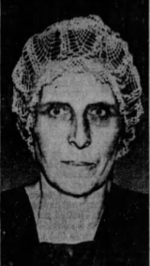 Detroit Free Press, November 2, 1941. On August 23, 1931, 68-year-old Steve Mak was rushed to the hospital in Detroit, Michigan, after allegedly falling from a ladder at the boarding house where he lived. He died two days later from the injuries he sustained. The owner of the boarding house, Rose Veres, told police she had asked Mak to repair an attic window and he had fallen off the ladder while doing so. Upon investigation, police discovered Veres had taken out an insurance policy on Mak’s life. John Walker, who rented out the other half of the house that Veres operated as a boarding house, told police he had seen Veres and her 18-year-old son William beat Mak, carry him up to the attic, and toss him out the window where the ladder stood. Walker claimed Veres had offered him $500 to keep quiet about what he had seen. The rumor around Veres’s neighborhood had long been that Veres, a Hungarian immigrant who spoke very little English, was a witch. She was sometimes referred to as “The Witch of Delray.” Prior to Mak’s death, eleven other men living in Veres’s house had died – some of alcohol poisoning, others of carbon monoxide poisoning, and still others appeared to have hanged themselves. Several of these men were married to Veres at the time of their deaths. In one instance, six years prior to Mak’s death, Veres had been questioned in connection with the death of one of the men, but it was later determined that he had died of natural causes. Veres had reportedly collected on insurance policies she had taken out on some of the other deceased boarders as well. Newspapers quickly ran with the story of an alleged witch whose boarders died mysterious deaths and it was widely covered across the country. Several days after police began investigating Mak’s death and Veres’s possible involvement, Assistant Prosecutor George M. Stutz reported that Veres had admitted to her friend that she had pushed Mak out the attic window after several attempts to poison him had failed. On September 1, 1931, Rose Veres and her son William were charged with murder. Two of her other lodgers were also arrested, with police claiming they had been responsible for attempting to poison Mak prior to his death. Veres hired Frank M. Kenney Jr. as her defense attorney. The trial of Rose Veres and her son began on October 1, 1931 before Recorder’s Judge Thomas Cotter. At the trial, the State produced evidence of two insurance policies totaling $5,200 on Mak’s life, paid for by and benefiting Rose Veres. Evidence of approximately 75 insurance policies taken out by Veres on the lives of her boarders was also admitted. John Walker testified that Rose had attempted to have Mak poisoned and that she and William had thrown him out the window when the attempted poisonings failed. 11-year-old neighbor Marie Chivala testified that she had been playing on her lawn across the street from Veres’s house when she witnessed Veres and William throw Mak from the attic window. Several other neighbors testified as well, including Bessie Hill, who stated that after Mak fell, Veres had come to her home in a disheveled state and asked for a towel to wash her hands and face. The prosecution relied on Hill’s testimony as support for its argument that Veres and William had first beaten Mak in the basement before pushing him out the attic window. The defense maintained that Mak had accidentally fallen when repairing the window and that Veres and William had not been involved in his death. Attorney Kenney argued that it was customary for boarding house operators to take out insurance policies on the lives of their boarders. Both Rose and William Veres were found guilty on October 5, 1931 and sentenced to life in prison. In May 1944, William Veres was granted a new trial, though the basis for the new trial was not specified in newspaper articles. The prosecutor, Julian McIntosh, then requested that the charges against William Veres be dismissed, stating that most of the necessary witnesses could not be located for a retrial. Judge John P. Scallen dismissed the charges, and William was freed. In October 1944, Rose Veres, represented by Ms. Alean B. Cutts, filed a motion for a new trial as well. The motion was based both on the claim that Veres had been largely unable to understand English at the time of her arrest and trial, as well as on evidence that Judge Cotter had not been in the courtroom at the time the murder verdict was returned. On April 16, 1945, Judge John J. Maher granted Veres a new trial. The retrial of Rose Veres began in late November 1945. Neighbor John Walker testified to the same story he had told at Veres’s first trial. Marie Chivala also testified to her story of witnessing Mak’s fatal fall. However, when Bessie Hill was called to testify, she denied in full her testimony from the original trial, despite being recalled by the judge, who criticized her reversal and warned of the penalties of perjury. Veres testified in her own defense using an interpreter to translate her words to English. On December 11, 1945, Veres was acquitted and released after fourteen years in prison. – Meghan Barrett Cousino
|